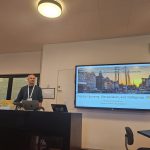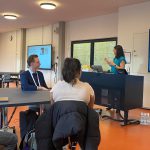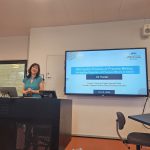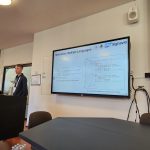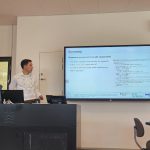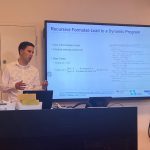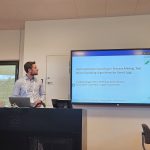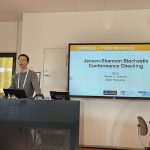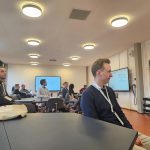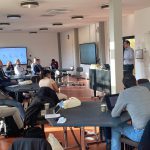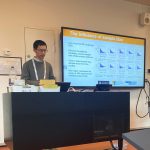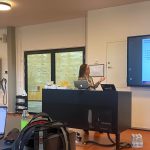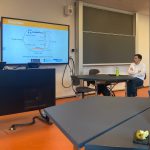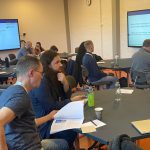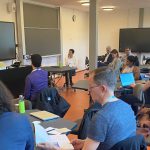The Ninth International Workshop on Process Querying, Manipulation, and Intelligence (PQMI 2024) aims to provide a high-quality forum for academics and practitioners to exchange research findings and ideas on methods and practices in the corresponding areas. Process Querying combines concepts from Big Data and Process Modeling and Analysis with Business Process Intelligence and Process Analytics to study techniques for retrieving and manipulating models of processes, both observed and recorded in the real-world and envisioned and designed in conceptual models, to systematically organize and extract process-related information for subsequent use. Process Manipulation studies inferences from real-world observations for augmenting, enhancing, and redesigning models of processes with the ultimate goal of improving real-world business processes. Process Intelligence looks into the application of representation models and approaches in Artificial Intelligence (AI), such as knowledge representation, search, automated planning, reasoning, natural language processing, explainable AI, autonomous agents, and multi-agent systems, among others, for solving problems in process mining, that is automated process discovery, conformance checking, and process enhancement, and vice versa using process mining techniques to tackle problems in AI. Techniques, methods, and tools for process querying, manipulation, and intelligence have applications in Business Process Management and Process Mining. Examples of practical problems tackled by the themes of the workshop include business process compliance management, business process weakness detection, process variance management, process performance analysis, predictive process monitoring, process model translation, syntactical correctness checking, process model comparison, infrequent behavior detection, process instance migration, process reuse, and process standardization. PQMI 2024 will be held in conjunction with the 6th International Conference on Process Mining (ICPM 2024). Follow us on twitter and visit the IEEE Task Force on Process Mining. 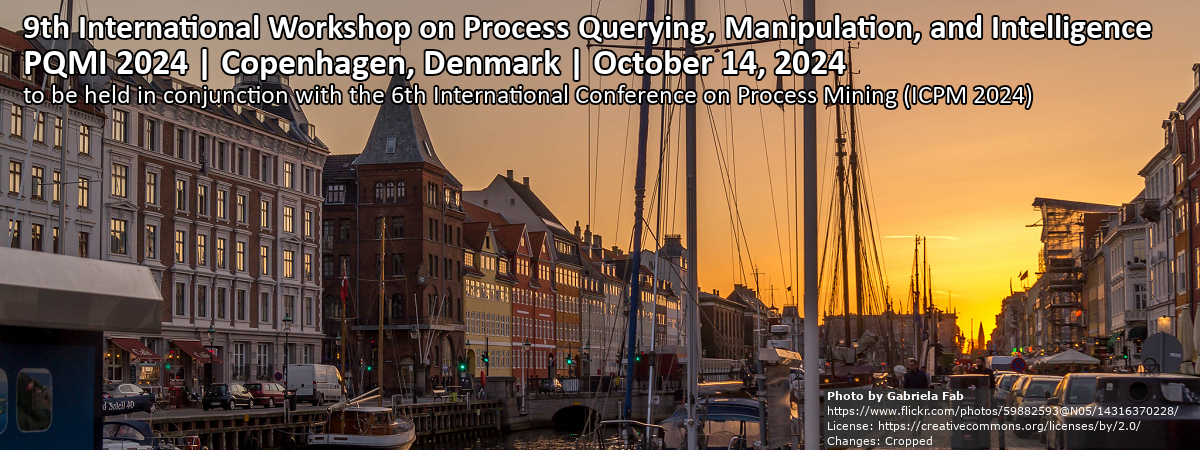
PROGRAM
To attend the workshop, please register here. All times are in CEST. The workshop will take place in Room 16, Building 116 (Bygningstorvet, 2800 Kongens Lyngby, Denmark).
| October 14, 2024, 09:00-10:30 – Room 16, Building 116 | |
|---|---|
| 09:00-09:10 | PQMI 2024 Opening |
| 09:10-10:00 | Keynote: Mining the Process of Process Mining: Navigating Cognition of Process Miners in Action Irit Hadar |
| 10:00-10:30 | Root Cause Analysis Using Rule Mining on Object-Centric Event Logs [PDF] Benedikt Knopp and Wil van der Aalst |
| October 14, 2024, 11:00-12:30 – Room 16, Building 116 | |
| 11:00-11:30 | The Jenson-Shannon Distance Metric for Stochastic Conformance Checking [PDF] Tian Li, Sander J.J. Leemans and Artem Polyvyanyy |
| 11:30-12:00 | Representative Sampling in Process Mining: Two Novel Sampling Algorithms for Event Logs [PDF] Frederik Fonger, Niclas Nebelung, Arvid Lepsien, Milda Aleknonyte-Resch and Agnes Koschmider |
| 12:00-12:30 | A Dynamic Programming Approach for Alignments on Process Trees [PDF] Wil M.P. van der Aalst, Wied Pakusa and Christopher T. Schwanen |
| October 14, 2024, 13:30-15:00 – Room 16, Building 116 | |
| 13:30-14:00 | An LLM-based Q&A Natural Language Interface to Process Mining [PDF] Luciana Barbieri, Kleber Stroeh, Edmundo Madeira and Wil van der Aalst |
| 14:00-14:30 | EVErPREP: Towards an Event Knowledge Graph enhanced Workflow Model for Event Log Preparation [PDF] Peter Filipp, Rene Dorsch and Andreas Harth |
| 14:30-15:00 | One Language to Rule them All: Behavioural Querying of Process Data using SQL [PDF] Jakob Brand, Timotheus Kampik, Cem Okulmus and Matthias Weidlich |
KEYNOTE
Mining the Process of Process Mining: Navigating Cognition of Process Miners in Action
Irit Hadar
Process mining research and development have thus far concentrated mainly on the technical perspective, proposing new approaches, methods, and tools. Recent studies on the process of process mining (PPM) have highlighted the importance of understanding the process miners’ perceptions and behavior. The PPM is led by the goal of making sense of the data and includes diverse activities such as data selection and preprocessing, process querying, and results interpretation. These activities involve complicated cognitive processes, requiring formal abstract thinking that may conflict with our natural intuitive thinking, and high cognitive load accumulating during the interactions with multiple views of vast amounts of data. These cognitive challenges may compromise the decisions made throughout the PPM and, as a result, the quality of its outcome. Theories from cognitive science provide insightful explanations regarding cognitive factors that play a role in such conditions. In my talk, I will focus on theories that extend the traditional cognitive paradigm, with specific focus on hypotheses generation and testing, and demonstrate their contributions to our field, using recent empirical evidence of cognitive processes underlying the PPM, e.g., during process querying. By understanding the cognitive challenges faced by the process miners and the reasons from which they stem, we may plot a course toward development of process mining methods and tools that better navigate and support process miners’ cognitive activities.
Prof. Irit Hadar is the Director of the Center for Cyber, Law and Policy, University of Haifa, founded in collaboration with the National Cyber Directorate. Hadar is also the Founder and Head of the multidisciplinary research hub: Deign Thinking for Socio-Technical Innovation, fostering research promoting human values via information technology. She received her Ph.D. from the Technion – Israel Institute of Technology. Her research focuses on cognitive and social aspects of software engineering, AI engineering, and data science with emphasis on process mining. Hadar serves as an editorial board member of Empirical Software Engineering and Requirements Engineering, has been serving as an organizer and PC member in conferences and workshops (e.g., ICSE, RE, CAiSE, ICIS), and as the Program Co-Chair of RE 2024. For more information, see http://is.haifa.ac.il/~
PHOTOS OF THE WORKSHOP DAY
WORKSHOP TOPICS
The main topics relevant to the PQMI workshop include, but are not limited to:
- Case studies in process querying, manipulation, and intelligence
- Empirical evaluations of process querying, manipulation, and intelligence techniques
Process Querying:
- Domain-specific programming languages for process querying, including syntax, semantics, and notation
- Process mining methods for implementing process querying tasks, e.g., retrieval of process-related information
- Process querying methods for supporting process mining tasks, e.g., filtering and manipulating event logs
- Behavioral and structural methods for process querying
- Natural language querying for process querying
- Exact and approximate process querying methods
- Experience reports from implementations of process querying tools
- Event log querying
- Multi-perspective process querying methods, e.g., querying process resources, data, etc.
- Process querying of big (process) data
- Meta-models and architectures for process querying
- Applications of process querying methods for process compliance, standardization, reuse, etc.
Process Manipulation:
- Process querying for process redesign and improvement
- Evidence-based and online process repair
- Process correction, incl. label correction and log repair
- Process redesign and improvement using rich ontologies and real-world event data
- Management of process model repositories
Process Intelligence:
- AI techniques for process discovery, conformance checking, and process enhancement
- Process mining techniques for tackling problems in AI, like search, reasoning, and knowledge representation
- Process mining artifacts as knowledge representations for solving AI problems
- Process mining and multi-agent systems
- Process mining and automated planning
- Process mining and natural language processing
- Simulation for event log generation
- Genetic algorithms for process mining
- Information retrieval methods for process mining
- Explainable AI for process mining
SUBMISSION INSTRUCTIONS
Prospective authors are invited to submit papers for presentation in any of the areas listed above. The paper selection will be based on the relevance of a paper to the main topics and on its quality and potential to generate relevant discussion. Authors are requested to prepare submissions according to the format of the Lecture Notes in Business Information Processing (LNBIP) series by Springer (http://www.springer.com/computer/lncs?SGWID=0-164-6-791344-0). Submissions must be in English and must not exceed 12 pages (including figures, bibliography, and appendices). Each paper should contain a short abstract, clarifying the relation of the paper with the main topics (preferably using the list of topics above), clearly state the problem being addressed, the goal of the work, the results achieved, and the relation to other work. Papers should be submitted electronically as a self-contained PDF file via the submission system (https://easychair.org/conferences/?conf=icpm2024). When submitting your paper, in the submission system, please select the name of the workshop track, “Workshop: Process Querying, Manipulation, and Intelligence.” Submissions must be original contributions that have not been published previously, nor already submitted to other conferences or journals in parallel with this workshop.
PUBLICATION
All workshop papers will be published by Springer as a post-workshop proceedings volume in the Lecture Notes in Business Information Processing (LNBIP) series. These proceedings will be made available to all registered participants approximately four months after the workshop, while preliminary proceedings will be distributed during the workshop. For each accepted paper, at least one author must register for the workshop and present the paper.
SPECIAL ISSUE
Authors of selected papers in PQMI 2024 will be invited to submit revised and extended versions of their work for a special issue in the Process Science journal. Upon acceptance, the journal will offer an open-access fee waiver.
ORGANIZERS
- Antonella Guzzo, University of Calabria
- Artem Polyvyanyy, The University of Melbourne
- Arthur H. M. ter Hofstede, Queensland University of Technology
- Claudio Di Ciccio, Utrecht University
TECHNICAL SUPPORT
- Anandi Karunaratne, The University of Melbourne
- Andrei Tour, The University of Melbourne
PROGRAM COMMITTEE
- Abel Armas Cervantes, The University of Melbourne
- Agnes Koschmider, University of Bayreuth
- Ahmed Awad, The British University in Dubai
- Anna Kalenkova, University of Adelaide
- Chiara Di Francescomarino, Fondazione Bruno Kessler-IRST
- Chun Ouyang, Queensland University of Technology
- Eugenio Vocaturo, University of Calabria
- Fabrizio Maggi, Free University of Bozen-Bolzano
- Hyerim Bae, Pusan National University
- Jochen De Weerdt, Katholieke Universiteit Leuven
- Kanika Goel, Deloitte
- Luciano García-Bañuelos, Tecnológico de Monterrey
- Minseok Song, Pohang University of Science and Technology
- Pnina Soffer, University of Haifa
- Seppe Vanden Broucke, Katholieke Universiteit Leuven
- Stefan Schoenig, University of Regensburg
- Timotheus Kampik, Umeå University
KEY DATES (Anywhere on Earth)
- Abstract submission deadline:
8 August 202415 August 2024 - Paper submission deadline:
15 August 202422 August 2024 - Acceptance notification:
2 September 20249 September 202413 September 2024 - Camera-ready submission:
23 September 202427 September 2024 - Workshop: 14 October 2024
CONTACT DETAILS
Inquiries regarding PQMI 2024 can be addressed to workshop@processquerying.com

